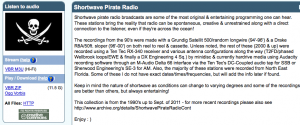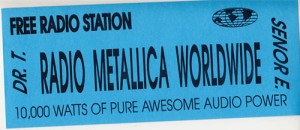Jason Scott is an archivist and historian of computer and internet history behind such great projects as textfiles.com, which preserves the wonders of the pre-web internet, as well as documentaries on pre-internet BBSs (bulletin-board systems) and text adventure games. Appropriately enough, he now works at the Internet Archive, and while catching up on his blog I came upon a post about a collection of shortwave pirate radio recordings hosted at the archive.
If radio tends to be an ephemeral medium, then shortwave pirate radio is especially ephemeral, heard by a very small audience, even if it is scattered across the globe. Shortwave pirate listeners tend to be dedicated, and recording airchecks is often part of the hobby. However, it’s one thing to record a shortwave pirate broadcast, and a whole other thing to catalog and preserve it. Luckily for us an enthusiast who goes by the name Sealord did just that, and then digitized the recordings and uploaded them to share.
The collection spans the mid-90s through to September 2011. I was pleased to find a couple of recordings from a station that called itself Radio Metallica Worldwide, which broadcast in the late 90s and mid-2000s. I remember this station well because it transmitted with a tremendous amount of power for a pirate and could be heard very clearly across most of North America. Back in 1996 and 1997, in my little apartment in Champaign, Illinois, I listened to the station many times on my Radio Shack Patrolman SW-60 radio that I’d had since I was a kid. Only with lots of effort and patience was I able to pick up any other pirate stations with that rig. But Radio Metallica Worldwide came in loud and clear (for shortwave, that is). In the October 26, 1997 recording the proprietor, Dr. Tornado, brags of using “10,000 watts of pure awesome audio power.” If true that would outclass most pirates by a factor of 100 or so. The station was so infamous that it merited an entry in Andrew Yoder’s 2001 book on Pirate Radio listening.
There’s plenty of interesting listening to be found, even if shortwave pirates tend to be unimaginative music programmers, too often falling back on tired classic and hard rock tunes that don’t fall too far afield of FM radio standards. And there have been archives of shortwave pirate recordings on the web pretty much since uploading audio to the internet became practical in the 1990s. In fact, I’m pretty sure I heard my first shortwave pirate programs on the internet (in RealAudio!), which then spurred me to try tuning in the broadcasts on the airwaves.
Listening to these recordings only makes me wish there were a similar collection of FM and AM pirates.




